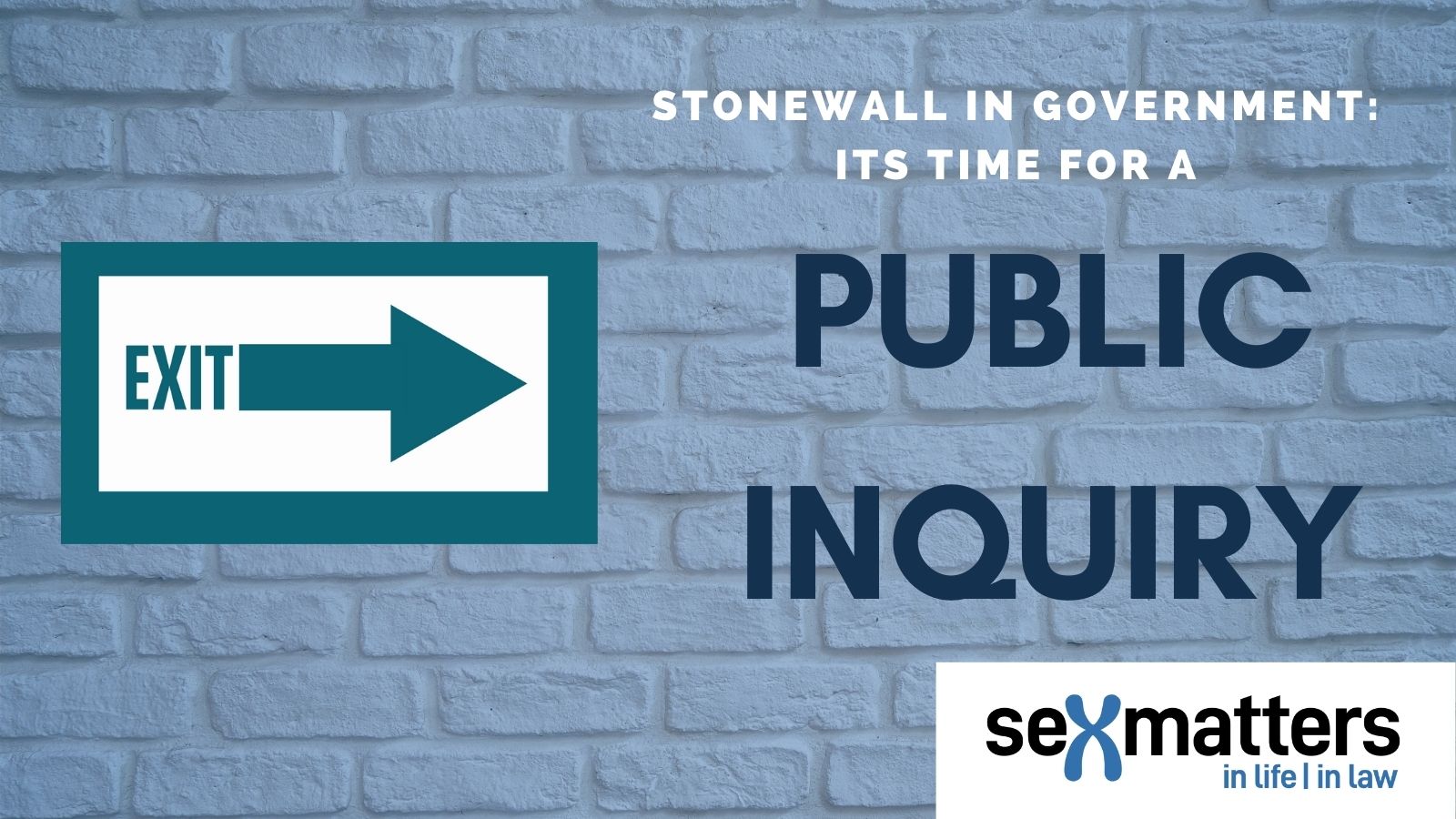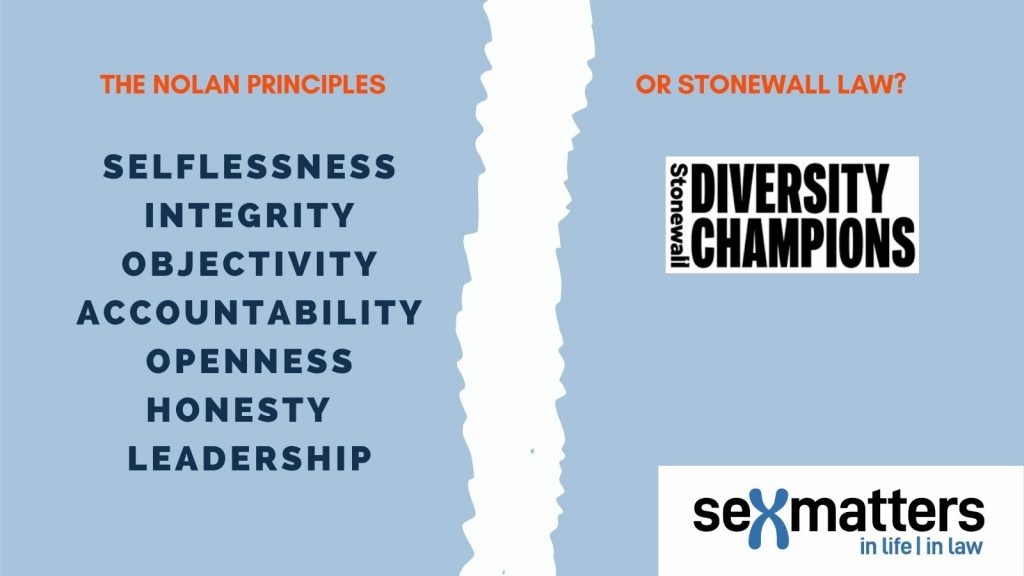It is time for a public inquiry

The Nolan investigation
In an explosive documentary just released by the BBC, journalist Stephen Nolan shines a bright light on the relationship between public bodies and Stonewall. The podcast series focuses on the BBC, the Scottish and Welsh Governments, the NHS and Ofcom.
It sets out how Stonewall as a lobby group has been paid by the government bodies to lobby public institutions, with public bodies first signing a “gagging clause” that they will not give out any information about that lobbying as it is commercially sensitive.
The series found Scottish civil servants promoting Stonewall’s view on self-ID through publicly funded road shows. It heard how Ofcom had used one of its own rulings about the conduct of public broadcasters to try to win points on Stonewall’s Workplace Equality Index, and how the Welsh government had adopted Stonewall’s view that ‘gender identity’ is a protected characteristic, even though that is not what the law says.
The programme is the result of an 18-month investigation.
Listen to all the episodes:
- Episode 1 – The Brief How the investigation began
- Episode 2 – Stonewall’s Schemes and the BBC How the BBC signed up to Stonewall’s Allies and Workplace Equality Index schemes
- Episode 3 – Self-ID and Gender Identity We look at the issues central to the debates around sex and gender
- Episode 4 – Being non-binary in the UK The UK’s first non-binary mayor, talks about what it’s like to be non-binary in the UK
- Episode 5 – A gender clinic insider speaks out Dr David Bell speaks about his experience of the UK’s leading gender clinic
- Episode 6 – Is Government Too Close to Stonewall? How close were governments across the UK to Stonewall?
- Episode 7 – Lobbying and the Law Was Stonewall’s advice to public bodies entirely accurate?
- Episode 8 – The Debate Trans and non-binary people with different perspectives debate the issues in the podcast.
- Episode 9 – How close was Ofcom to Stonewall? Was the media regulator too keen to please a lobby group?
- Episode 10 – Is the BBC too close to Stonewall? We look at whether the BBC’s output was influenced by Stonewall
Sex Matters calls for a public inquiry
Sex Matters calls for a public inquiry into the influence of Stonewall and its associated organisations over public bodies. We think that the Nolan Principles of public life have been systematically breached.

In September we sent a letter signed by 7,893 people to the chair of the independent Committee on Standards in Public Life calling for a public inquiry.
Signatories included over:
200 academics
150 students
500 teachers
170 retired teachers and head teachers
235 others involved in education
75 doctors
30 psychologists
80 therapists
30 NHS managers
100 nurses
30 mental health nurses
15 midwives
10 occupational therapists
10 emergency medical workers
190 other healthcare professionals
150 retired healthcare professionals
40 social workers
175 care sector workers
50 retired social care professionals
60 civil servants
20 local councillors
80 other public servants
60 retired public servants
230 legal professionals
20 retired legal professionals
67 police officers, security, prisons, firefighters
209 campaigners and charity professionals,
50 sports and fitness professionals
200 engineers, architects and builders
200 accountants and financial managers
60 HR managers
665 business people
75 people n hospitality
300 people in IT
300 people in media and arts
60 ministers of religion
80 people working with environment and nature
250 administrators
120 in customer service
37 in transport and logistics
200 parents and carers
760 retired and disabled people
Sex Matters’ call for a public inquiry
Dear Lord Evans,
Chair of the Committee on Standards in Public Life
Sex matters in many areas of life. But public institutions have adopted policies which replace clarity about the two sexes with self identification on a spectrum of ‘gender identity’. In doing this they have departed from the law. Erasing sex undermines equality, safeguarding, data collection, evidence-based policy making and the rule of law, especially the application of the Equality Act 2010.
This is happening not through democratic processes, but at the behest of lobby groups claiming to represent the interests of a transgender minority. It is enabled by institutional capture, the threat of being called “transphobic”, and the chilling effect of intimidation and closing down of debate.
When JK Rowling expressed her concerns in measured, careful and compassionate terms, the ferocity of the response served as a warning to others. Ordinary people from every sphere of life face similar attacks. They fear losing their security, their freedom to speak, their livelihoods and maybe even liberty.
As one NHS consultant said, in words that were read out in House of Lords:
“I have campaigned for equality across the board all my life and yet now I’m dismissed as a bigot and a transphobe for even trying to raise concerns at all.”
This is a situation that public bodies have walked into with the best of intentions. Roughly 250 Government departments and public bodies, including police forces, local councils and NHS trusts, are members of Stonewall’s “Diversity Champions” scheme. Others are trained by Gendered Intelligence, Mermaids, and other allied organisations. These institutions adopt a broad definition of “transphobia” and commit to an approach of “zero tolerance”.
Public bodies demonstrate their allegiance through measures such as rebranding their logos with rainbows, substituting gender for the protected characteristic of sex in their equality policies and monitoring, and adopting a definition of “transphobia” that makes dissent a disciplinary matter.
We support the aims of ensuring that transgender people are not discriminated against or harassed in employment and as users of services. But the demands of these organisations go beyond that, and seek to compel acceptance of a set of beliefs about sex and gender identity; what it means to be male or female.
Individual practices are now being tested in court, and judges are expressing surprise at the lack of evidence, data and oversight underpinning them. Examples include Keira Bell’s challenge of the Tavistock Clinic’s treatment of gender dysphoric children with puberty blocking drugs; the ongoing judicial review of the accommodation of male prisoners who have obtained a “gender recognition certificate” in women’s prisons; and the judicial review of the Office of National Statistics’ advising people to disregard what it says on their birth certificate when answering the sex question in the census. Her Majesty’s Passport Office has admitted that it has no record of how many people it has allowed to change the sex recorded on their passport from “M” to “F” with a simple template letter downloaded from the internet and signed by a GP. The Equality and Human Rights Commission is being challenged for its failure to publish clear guidance on single sex services.
Legal cases are one way to bring arguments and evidence into public debate and scrutiny. But they are expensive, and these policies are pervasive; across schools, universities, the NHS, local government, regulators, the charitable sector. The dots need to be joined up. And those who are disadvantaged and put at risk when safeguarding protections are corroded, and single sex services removed or made ambiguous, are often the most vulnerable and least able to complain.
These cases have been supported by an extraordinary movement of grassroots groups, funded by thousands of people contributing small amounts of money. This mobilisation is testament to a failure of the institutions of public life to hold open space for debate and deliberation.
Recently in parliament a debate broke through the chilling effect, following the introduction of a bill on maternity leave for Ministers, which avoided using either the words “woman” or “mother”. It took courage for MPs and Lords to speak up. As cross-bench Lord Baroness Tanni-Grey Thomson said
“This is a contentious issue and in this debate there will be many views… We need to be able to have an open discussion, without fear of retribution, of being cancelled or shouted down for discussing terminology or having a different view. …
I thought long and hard about joining the debate today and whether I could deal with any potential backlash that may come my way for saying that the word “woman” should be in this Bill. …Being told what my opinion should be does not encourage sharing of views and is detrimental to the long-term goal of equality.”
We urge you to read the whole of those debates, particularly those in the House of Lords on 22 and 25 February where Lords from across the house expressed grave concerned about the impacts of the erasure of sex on law and policy, on freedom of speech and on public decision making and the culture of public institutions.
This is a systemic issue, across national and local government institutions and private and voluntary institutions. Fear of speaking clearly and recognising reality makes it impossible for people to do their jobs with integrity, objectivity and accountability and to pursue equality.
The Committee on Standards in Public Life, uniquely and unquestionably, has a remit and responsibility to take this up. We urge you to speak up and to call for leaders of institutions to refocus on building cultures that enable selflessness, integrity, objectivity, accountability, openness, honesty and leadership, not identity politics. We call the Committee to open an inquiry into the political erasure of sex in the UK.
